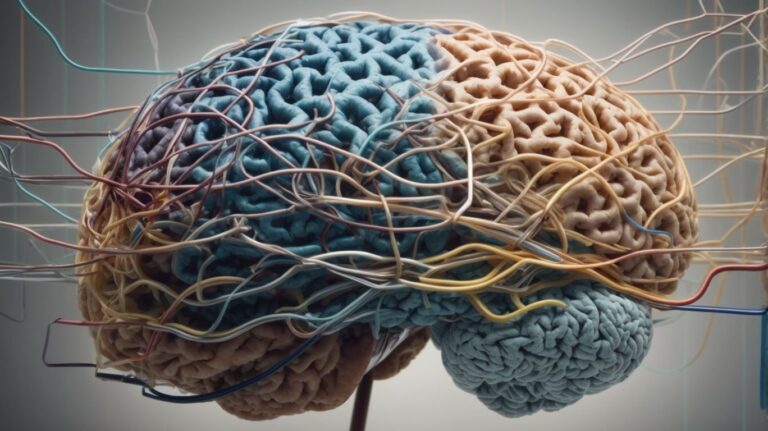Understanding human behavior and psychological phenomena is a complex and fascinating endeavor. In the field of psychology, the role of explanation is crucial in gaining insight into motivations, identifying underlying causes, predicting future behavior, and guiding treatment.
Explanations in psychology also have their limitations, such as simplifying complex phenomena and potential bias. In this article, we will explore the importance of explanation in psychology, the different types of explanations, and how psychologists can improve their explanatory frameworks to better understand human behavior and psychological phenomena.
Contents
- 1 Key Takeaways:
- 2 The Importance of Explanation in Psychology
- 3 What is the Role of Explanation in Understanding Behavior?
- 4 How Do Explanations Help in Understanding Psychological Phenomena?
- 5 What Are the Limitations of Explanation in Psychology?
- 6 How Can Psychologists Improve their Explanatory Frameworks?
- 7 Frequently Asked Questions
- 7.1 What is the role of explanation in psychology?
- 7.2 Why is understanding behavior and phenomena important in psychology?
- 7.3 How does explanation contribute to our understanding of behavior and phenomena?
- 7.4 What are some examples of phenomena that can be explained through psychology?
- 7.5 What role do theories play in explanation in psychology?
- 7.6 How does understanding behavior and phenomena benefit individuals and society?
Key Takeaways:
The Importance of Explanation in Psychology
The importance of explanation in psychology cannot be overstated, as it forms the bedrock of understanding various psychological phenomena through scientific theories and empirical research.
Explanation plays a pivotal role in elucidating the complexities of human behavior, cognition, and emotion. It provides insights into the underlying mechanisms of mental processes and serves as a crucial tool for psychologists. They use it to comprehend, interpret, and communicate the intricate interplay of individual and environmental factors that shape human experiences.
Through in-depth explanations, psychologists can unravel the underlying causes of psychological disorders, cognitive biases, and interpersonal dynamics. This fosters a deeper understanding of the human mind and behavior, making it an essential aspect of psychological research and practice.
What is the Role of Explanation in Understanding Behavior?
The role of explanation in understanding behavior goes beyond mere description, as it delves into the underlying cognitive processes, emotional dynamics, and ethical considerations surrounding human participants and research methodologies.
By grasping the importance of explanation in understanding behavior, one can unravel the intricate interplay of various cognitive processes such as memory, attention, and decision-making that shape human actions.
A deeper comprehension of emotional responses and their influence on behavior provides valuable insights into the complexities of human reactions to differing stimuli.
Ethical considerations in research, intertwined with the need for accurate and respectful portrayal of human behavior, highlight the ethical responsibility that comes with providing explanations in behavioral studies.
How Does Explanation Differ from Description?
Explanation differs from mere description by diving into the underlying psychological phenomena, theories such as drive theory and intelligence, and the ethical frameworks set by institutional review boards for fairness and participant protection.
In terms of psychological phenomena, description primarily focuses on external characteristics and observable behaviors, providing a surface-level account without necessarily diving into the deeper mechanisms. Conversely, explanation delves into the complex cognitive processes, emotions, and motivations underlying these phenomena, offering deeper insight into the ‘why’ behind human behavior.
The theoretical frameworks such as drive theory and intelligence theories play a pivotal role in distinguishing between mere description and comprehensive explanation. These frameworks provide the theoretical underpinnings for understanding human behavior and cognition, offering a foundation for in-depth analysis and interpretation.
Furthermore, ethical frameworks set by institutional review boards are crucial in the realm of psychological research. While mere description may not always consider ethical implications, a thorough explanation of psychological phenomena encompasses ethical considerations to ensure participant protection and the fairness of research procedures.
What Are the Different Types of Explanations in Psychology?
In psychology, various types of explanations exist, including those rooted in the biological perspective, statistical relationships, mental abilities, and empirical evidence derived from experiments such as social facilitation.
These different explanations in psychology highlight the multifaceted nature of the discipline.
The biological perspective delves into the role of genetics, brain structure, and neurochemicals in understanding human behavior and mental processes.
Meanwhile, statistical relationships provide valuable insights into identifying patterns and trends within psychological phenomena, offering a quantitative angle to the field.
The study of mental abilities focuses on understanding cognitive processes, intelligence, perception, and problem-solving, shedding light on fundamental aspects of human cognition and behavior.
Empirical evidence from experiments, such as those involving social facilitation, allows researchers to observe how the presence of others impacts individual performance and behavior, contributing to a richer understanding of social dynamics and interactions.
How Do Explanations Help in Understanding Psychological Phenomena?
Explanations play a pivotal role in understanding psychological phenomena by enabling predictions, empirical validation through research, and elucidating the underlying cognitive processes and emotional dynamics at play.
Understanding psychological phenomena requires an intricate grasp of the intricate workings of the human mind and behavior. Explanations serve as the linchpin in this pursuit, allowing researchers to make predictions based on underlying mechanisms and theoretical frameworks.
The role of explanations is essential in shaping the trajectory of empirical research, providing a roadmap for formulating hypotheses and designing studies to empirically test theories and ideas. Within the realm of cognitive psychology, explanations are instrumental in unraveling the complexity of mental processes, shedding light on attention, memory, problem-solving, and decision-making.
Provides Insight into Motivations and Intentions
Explanations provide valuable insight into the motivations and intentions that underlie human behavior, as elucidated by scientific theories and cognitive processes.
When individuals seek to understand the reasons behind their actions or those of others, the application of scientific theories and cognitive processes offers a framework for deciphering the complexities of human behavior.
For instance, social cognitive theory delves into how individuals’ interactions with their social environment influence their behavior and motivations. The study of neuroscience sheds light on the physiological processes associated with decision-making and the formation of intentions. By integrating these psychological phenomena, explanations can bridge the gap between observable behavior and the underlying cognitive and emotional states.
Identifies Underlying Causes and Triggers
Explanations serve to identify the underlying causes and triggers of psychological phenomena, drawing upon theories such as drive theory and empirical research to uncover their roots.
Understanding the intricate web of human behavior often requires diving into the deep-seated motivations and influences that shape our thoughts and actions.
Drive theory, with its emphasis on internal drives and motivations, offers valuable insights into the core reasons behind behavioral patterns.
Empirical research, rooted in observation and measurement, lends credibility to these theoretical underpinnings, providing real-world validation for the concepts elucidated.
By scrutinizing these factors, researchers can gain a profound understanding of the complexities that underpin psychological phenomena, paving the way for more effective interventions and treatments.
Predicts Future Behavior and Outcomes
Explanations facilitate the prediction of future behavior and outcomes through the application of empirical research, insights into mental abilities, and the formulation of hypotheses based on explanatory frameworks.
By analyzing past trends and patterns in behavior, researchers can develop predictive models that offer valuable insights into potential future actions and events. Understanding the intricate complexities of human cognition and decision-making processes plays a crucial role in crafting accurate forecasts.
The formulation of predictive hypotheses guides the systematic testing of various scenarios, allowing for a more refined understanding of the factors influencing future outcomes. This integration of empirical evidence and cognitive analysis provides a robust foundation for anticipating and preparing for potential future developments.
Guides Treatment and Interventions
Explanations play a crucial role in guiding treatment and interventions for psychological phenomena, taking into account cognitive processes, ethical considerations, and the protection of human participants through informed consent and institutional review board oversight.
Understanding the underlying cognitive processes and ethical implications behind psychological phenomena is essential for clinicians and researchers to provide effective and ethical treatment and interventions.
The informed consent process ensures that participants have a clear understanding of the treatment or intervention being offered, its potential benefits, risks, and alternatives, as well as the voluntariness of their participation. Institutional review boards oversee the protection of participant rights and ethical conduct, ensuring that research is conducted in a manner that respects the dignity and safeguards the well-being of individuals.
What Are the Limitations of Explanation in Psychology?
Despite its benefits, explanation in psychology is not without limitations, including the potential simplification of complex phenomena, susceptibility to bias, and challenges related to generalizability.
When attempting to explain psychological phenomena, there is a risk of oversimplifying intricate processes or experiences due to the intricate nature of the human mind.
This simplification may lead to a lack of depth in understanding the complexities of human behavior and cognition.
The potential for bias in the explanation of psychological phenomena cannot be ignored. Whether it is the researcher’s own biases impacting the interpretation of data or the influence of societal and cultural biases, a skewed perspective can hinder the accuracy of psychological explanations.
Another challenge in the realm of psychological explanations is the issue of generalizability. While a certain explanation may hold true for a specific group or context, its applicability to a broader population or diverse settings may be limited, thereby constraining its generalizability.
Simplification of Complex Phenomena
One of the limitations of explanation in psychology is the potential oversimplification of complex phenomena, which may obscure the intricate nature of psychological processes and behaviors.
When attempting to convey intricate psychological concepts in simplified terms, crucial nuances and intricacies can get lost in translation. This oversimplification may lead to a superficial understanding of the underlying mechanisms governing human cognition and behavior.
Furthermore, oversimplification can impede efforts to comprehend complex interrelationships between various psychological variables, hindering the development of comprehensive theories and models. Critical factors such as individual differences, cultural influences, and contextual variations often elude oversimplified explanations.
These omissions have substantial ramifications, restricting the depth of understanding and potentially leading to misinterpretations of psychological phenomena. It is imperative for psychological explanations to embrace the complexity inherent in human experiences, and not succumb to the allure of simplification at the expense of accuracy and depth.
Potential for Bias and Subjectivity
Another limitation of explanation in psychology lies in the potential for bias and subjectivity, affecting the interpretation of empirical research findings and the fairness of explanatory frameworks.
These biases can stem from various sources, including the researchers themselves, cultural influences, and even the participants involved in the studies. This introduces the challenge of distinguishing between genuine empirical evidence and the influence of preconceived notions or personal perspectives.
Such subjectivity can lead to skewed interpretations and hinder the objectivity of the research outcomes. The impact of bias and subjectivity extends beyond individual studies, shaping the overarching theories and models within psychology. When these frameworks are influenced by subjective perspectives, it can result in a lack of inclusivity and accuracy, perpetuating misconceptions and misinterpretations.
Lack of Generalizability
Additionally, explanation in psychology may face challenges in generalizability, as findings from specific experiments and research contexts may not universally apply to diverse psychological phenomena.
This limitation arises due to the complex and multifaceted nature of psychological processes, as well as the unique circumstances under which experiments and studies are conducted.
Furthermore, individual differences and cultural variations pose additional hurdles in extrapolating findings to broader populations. The intricacies of human behavior and cognition contribute to the difficulty in making universally applicable generalizations across different psychological phenomena.
How Can Psychologists Improve their Explanatory Frameworks?
Psychologists can enhance their explanatory frameworks by incorporating multiple perspectives, empirical evidence, and considerations of context and culture, thereby enriching the depth and applicability of their explanations.
These strategies ensure that their theories and models reflect the complexity of human behavior and psychological processes.
By integrating diverse viewpoints and research findings, psychologists can develop more comprehensive and nuanced explanations for various phenomena.
The inclusion of contextual factors allows for a deeper understanding of the dynamic interplay between individuals and their environments, thereby strengthening the validity and generalizability of their explanations.
Incorporating Multiple Perspectives
To improve their explanatory frameworks, psychologists should actively incorporate multiple perspectives, taking into account the influence of context and culture on the phenomena under study.
By integrating multiple perspectives, psychologists can gain a more comprehensive understanding of psychological phenomena, allowing for richer insights into human behavior and cognition.
This approach acknowledges that no single perspective can fully capture the complexity of human experiences, emphasizing the need to consider diverse viewpoints for a more complete picture.
Recognizing the impact of context and culture is essential for understanding the nuances of psychological phenomena.
The integration of these factors into explanatory frameworks facilitates a more culturally sensitive and contextually informed approach, aligning with the evolving emphasis on cultural psychology in contemporary research.
Utilizing Empirical Evidence
Psychologists can strengthen their explanatory frameworks by rigorously utilizing empirical evidence and adhering to ethical considerations, ensuring the validity and reliability of their explanations while safeguarding the well-being of human participants through informed consent.
Integrating empirical evidence in research offers a systematic approach to addressing complex research questions. It emphasizes the importance of basing conclusions on verifiable data rather than mere conjecture, thereby enhancing the credibility of the findings.
This practice underscores the ethical responsibility to protect the rights and well-being of participants, acknowledging their autonomy and informed consent as fundamental tenets of research integrity. By integrating empirical evidence, psychologists reinforce the scientific robustness of their work and contribute to the development of reliable and sustainable explanatory frameworks.
Considering Context and Culture
Psychologists should consider the influence of context and culture in shaping their explanatory frameworks, thereby ensuring ethical conduct, fairness, and a comprehensive understanding of psychological phenomena.
Integration of context and cultural factors enables psychologists to recognize the diverse perspectives and norms that affect individuals’ behaviors and mental processes.
By acknowledging the socio-cultural influences, psychologists can develop culturally competent practices and interventions, thus promoting ethical sensitivity and fairness in their research and clinical work.
Understanding how context and culture impact psychological phenomena facilitates a more holistic and nuanced analysis, providing deeper insights into the complexities of human experiences and behaviors.
Frequently Asked Questions
What is the role of explanation in psychology?
The role of explanation in psychology is to provide a deeper understanding of human behavior and phenomena through the use of theories, research, and evidence.
Why is understanding behavior and phenomena important in psychology?
Understanding behavior and phenomena is crucial in psychology as it allows us to make sense of human actions, thoughts, and emotions, and ultimately improve the well-being of individuals and society.
How does explanation contribute to our understanding of behavior and phenomena?
Explanation in psychology helps us to identify patterns and underlying causes of behavior and phenomena, and provides a framework for predicting and modifying future behavior.
What are some examples of phenomena that can be explained through psychology?
Some examples of phenomena that can be explained through psychology include memory, perception, motivation, emotions, social interactions, and mental disorders.
What role do theories play in explanation in psychology?
Theories serve as a guide for understanding and explaining behavior and phenomena in psychology by providing a framework for organizing and interpreting data and observations.
How does understanding behavior and phenomena benefit individuals and society?
Understanding behavior and phenomena in psychology can lead to improved mental health and well-being for individuals, and can also inform the development of interventions and policies for the betterment of society as a whole.




